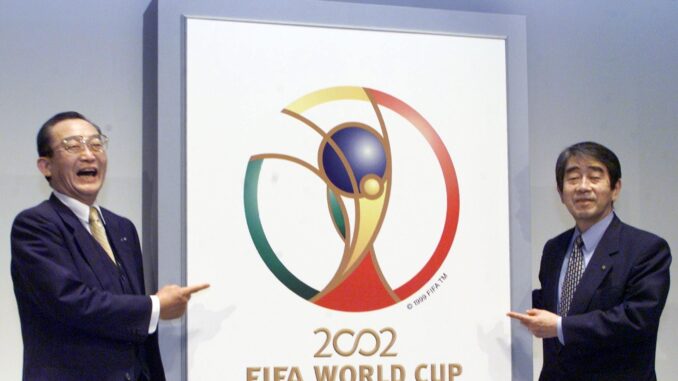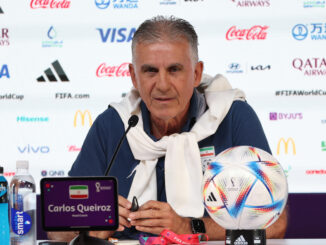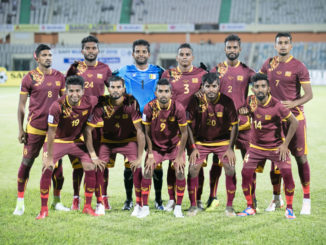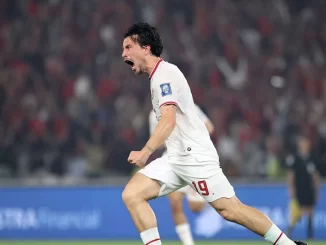

The Asian Game’s coverage of the FIFA World Cup Qatar 2022 is proudly sponsored by SMC.
The 2002 FIFA World Cup Korea-Japan is often remembered for Brazil’s record fifth title win, the first-ever co-hosting of the tournament and Korea Republic’s run to the semi-finals. It was all of this and much more and in our three-part series The Asian Game looks back at the difficult road that led to Asia’s first World Cup and the tournament’s lasting legacy.
“Having just received a letter from the Japan Football Association stating that they would be prepared to agree to the joint organisation of the World Cup, as the Korea Republic has already done, and bearing in mind that this was the wish of some of the executive committee members, I now propose that a file for the co-hosting of the 2002 World Cup be opened.”
With that proclamation, made in the ornate surroundings of Zurich’s Dolder Grand Hotel, FIFA president Joao Havelange brought down the curtain on one of the most fractious hosting campaigns in sporting history. After more than three years of wrangling and political posturing, South Korea and Japan would be sharing the hosting duties for the 2002 FIFA World Cup.
It was an unprecedented and historic move, and one which sought to soothe the wounds and bruises administered by two of Asian football’s greatest rivals to one another after a rancorous, bitter battle that went far beyond sport as it dredged up deep-rooted historical grievances.
No sporting organisation had ever attempted to host an event the size or scale of the World Cup across two nations, never mind in a pair of countries that had used tactics fair and foul to disparage the other in an attempt to claim the rights to themselves. FIFA were stepping into new territory.
“Korea and Japan have an unhappy history, there has been a lack of understanding,” said Dr Chung Mong-joon, president of the Korea Football Association, after the decision had been made to share the World Cup between the two nations.
“We have been close but distant neighbours. We hope that this can be a milestone to overcoming past problems and have a better relationship in the future.”
Embed from Getty ImagesIt was FIFA executive committee member Chung, a scion of the influential family that owns the Hyundai conglomerate, who had done much to drive a wedge between the two countries throughout a drawn-out and poisonous bidding campaign.
The shrewd US-educated 43-year-old had brought all his political guile and ruthlessness to bear on the campaign to overhaul early favourites Japan and secure his nation a share of the World Cup many in South Korea believed was their right.
As the country with Asia’s best World Cup qualifying record – the Koreans had appeared at the finals in 1954, 1986, 1990 and 1994 – there was a determination not to be outdone by their neighbours when FIFA opened up the bidding for 2002.
By contrast, the Japanese were the cash-rich new kids on the football block. The country had gained a growing profile in the sport, initially due to advertising agency Dentsu’s increased use of the World Cup as a platform for Japanese companies, and then through the glitz and glamour of the recently launched J.League.
But while the blossoming of Japanese football reflected the game’s global growth in the mid-1990s, concerns were starting to be raised and the stakes were high for the sport during the countdown to FIFA’s World Cup decision.
“Naturally people in both countries are disappointed, especially Japan as they were the front runner for so many years,” said Asian Football Confederation general secretary Peter Velappan. “But they could have lost everything and they could not afford to do that. If they had not got the World Cup, in five years’ time there would have been no soccer in Japan.”
Velappan, the de facto leader of Asian football for much of the previous two decades, had been at the vanguard of those pushing for co-hosting and his concerns were well founded.
While the J.League had kicked off with great fanfare in 1993, several clubs were experiencing financial issues, with fewer of the highly paid foreign stars initially attracted to the league making their way to Japan.
Added to the country’s agonising last-gasp failure to qualify for the 1994 World Cup, Japan’s lack of a football heritage – they had yet to qualify for their first finals – as significant as Korea’s meant the political naivety of the country’s bid team was ripe for exploitation.
The Japanese had started the bidding process as the runaway favourites. Havelange had sought to anoint the nation as hosts in the aftermath of the success of the 1994 World Cup in the United States, knowing that the commercial opportunities for FIFA of a Japan-hosted tournament would be significant.
But the Brazilian had not considered how such a move would play out in the region and the Koreans stepped in with a rival bid, motivated by a long-festering sense of grievance still held over Japan’s occupation of the Korean peninsula during much of the first half of the 20th century.
With the Korean government and the might of the Chaebol – the family-owned conglomerates that make up the backbone of the Korean economy – behind the bid, the country embarked on a global campaign to canvass support as Chung worked in the corridors of power to convince FIFA executives to vote for his nation ahead of the Japanese.
Rarely did a day pass without claims and counterclaims filling the pages of newspapers around the world. A vote for Korea, went one line, was a way to show the once all-powerful Havelange he could no longer railroad decisions through FIFA’s executive as he often had in the past.
The Japanese struggled in the face of Korea’s all-out onslaught and, in the days leading up to the announcement in Zurich, there was a growing realisation that Japan had two choices: accept a co-hosting agreement or lose out completely.
Embed from Getty ImagesJapan Football Association president Ken Naganuma and his cohorts found themselves in an unenviable position before, on the evening of May 30, accepting the inevitable and sending the letter to Havelange effectively conceding defeat. A day later, the FIFA president announced the 2002 World Cup would be co-hosted.
Rather than bring an end to the friction between the nations, however, the decision dredged up a new set of issues. Any public cordiality was parked outside as FIFA general secretary Sepp Blatter and his administration sought to implement the executive committee’s decision.
Every minor matter turned into a battlefield, with the Koreans often outflanking their Japanese counterparts.
No issue was more public-facing than the name of the tournament. Assumptions it would be known as the 2002 FIFA World Cup Japan-Korea were shot down by Chung, who pointed out Korea came before Japan in more of FIFA’s official languages alphabetically. It may seem petty, but for his home audience Chung’s determination to place Korea before Japan was of significance.
The Koreans also won the fight to host the opening game – and, importantly for Chung, the FIFA Congress days before the start of the competition – with the final to be held in Japan.
Neither nation, meanwhile, would give up any of their proposed venues, leaving both countries to play half a World Cup in 10 stadia each, all built out of the public purse in their respective nations. The legacy of a multitude of white elephant stadiums in remote locations is one both countries still wrestle with today.
In the end, though, the wrangling came to an end and the football eventually came into view. On May 31, 2002 – six years after Havelange’s announcement – Asia’s first World Cup was ready to kick off.
Part Two of out three-part series looking back at Asia’s first ever men’s FIFA World Cup, Korea-Japan 2002, will continue on Wednesday when we take a look at the action of the tournament itself.
PHOTO: Getty Images
Listen to Episode 91 of The Asian Game Podcast as we dissect the saga engulfing Iranian football just months out from the FIFA World Cup.




